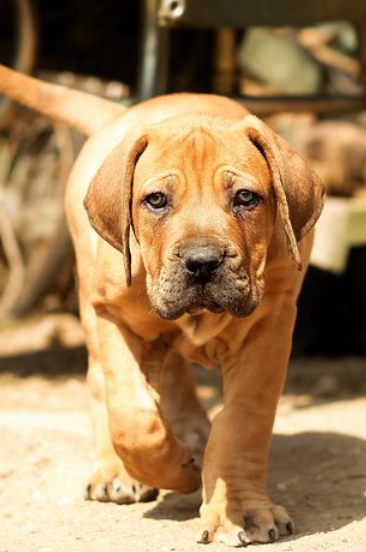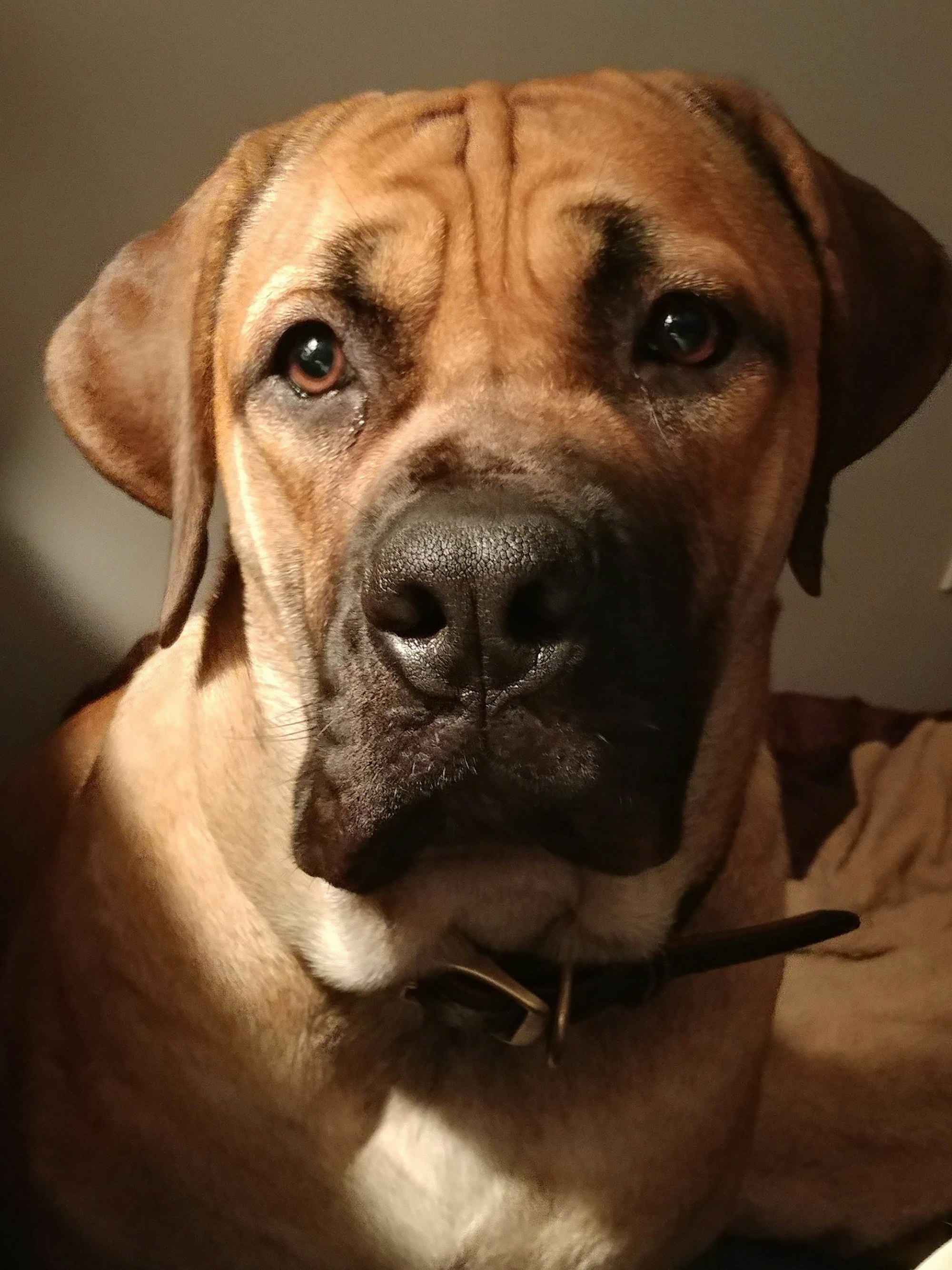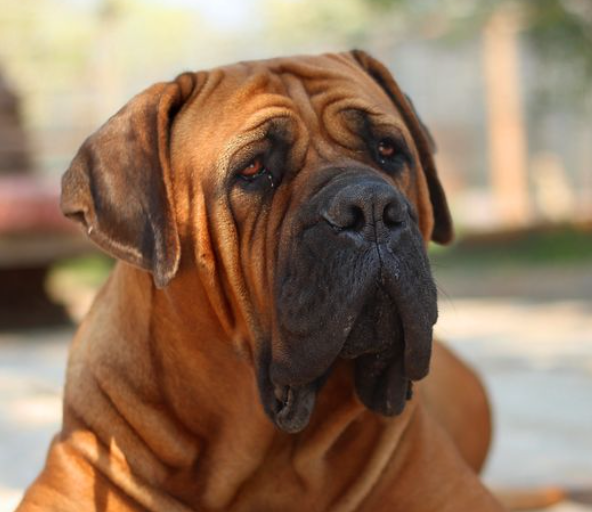Are you looking for a loyal, protective, and affectionate companion? Look no further than the Boerboel! Known as South Africa's Mastiff, the Boerboel is a large and powerful breed with a rich history and a unique set of characteristics. In this ultimate guide, we'll cover everything you need to know about this magnificent breed, from its origins to its temperament, care, and training. So, let's dive in!
The Boerboel is a large and impressive breed that originated in South Africa. It was bred to guard and protect farms and livestock, and it remains a popular working dog and family companion to this day. Despite its size and strength, the Boerboel is known for its affectionate and loyal nature, making it an ideal pet for families and individuals who want a protective yet gentle dog. In this guide, we'll cover everything you need to know about owning and caring for a Boerboel.

Origins and History of the Boerboel
The Boerboel is a relatively new breed, with its origins dating back to the 17th century in South Africa. It was developed by Dutch settlers who needed a dog that could guard their farms and livestock against predators and thieves. They bred local African dogs, such as the Khoikhoi dog and the Africanis, with imported European breeds, including Mastiffs, Bulldogs, and Bloodhounds.
Over time, the Boerboel became a popular and versatile working dog, used not only for guarding farms and livestock but also for hunting, tracking, and even fighting. However, its popularity declined in the 20th century due to the introduction of modern farming practices and the rise of other breeds. Fortunately, a group of dedicated breeders worked to revive the Boerboel, and it was officially recognized as a breed by the Kennel Union of Southern Africa in 1983.
Appearance and physical characteristics
Size and weight
The Boerboel is a large and muscular dog, with males standing 24 to 27 inches tall and weighing between 150 and 200 pounds, while females are slightly smaller, standing 22 to 25 inches tall and weighing between 110 and 154 pounds. Boerboels have broad heads and powerful jaws, which makes them excellent guard dogs.
Coat and colors
The Boerboel has a short, dense, and shiny coat that comes in various shades of brown, ranging from fawn to brindle to black. Some Boerboels also have a small white patch on their chest.
Eye color
Boerboels can have a variety of eye colors, including brown, amber, and even blue. However, blue eyes are not as common in Boerboels as they are in some other breeds, and they can be a sign of genetic issues such as deafness or vision problems. It is important to work with a reputable breeder who carefully selects healthy genetics and can provide information on the eye color of both the dam and sire. Additionally, regular eye exams by a veterinarian can help ensure that any potential eye problems are caught and treated early.

Temperament and personality
Loyal and protective
The Boerboel is a loyal and protective breed that will fiercely defend its family and territory. It is naturally suspicious of strangers and has a deep bark that can intimidate intruders. However, with proper training and socialization, the Boerboel can learn to differentiate between friends and foes and become a well-behaved and trustworthy companion.
Affectionate and Friendly
The Boerboel is a breed that is known for its loyalty and protective nature. This means that the Boerboel is highly devoted to its family and will do everything in its power to protect them from any harm. They are very aware of their surroundings and are quick to alert their family of any potential threats. Because of this, they make excellent watchdogs and guardians.
The Boerboel's protective nature is a result of its history as a working dog. The breed was originally bred to guard and protect farms and livestock, which required a strong and vigilant dog. Even today, the Boerboel is a popular breed for use as a guard dog and protector.
However, it is important to note that the Boerboel's protective nature can sometimes translate into aggression if the dog is not properly trained and socialized. It is important to work with a reputable breeder and a professional trainer to ensure that your Boerboel is well-behaved and able to distinguish between friend and foe.
Despite their protective instincts, Boerboels can also be very affectionate and friendly towards their family members. They love to be close to their people and enjoy spending time with them. They are known to be great with children, as they are patient and gentle with them.
Overall, the Boerboel's loyal and protective nature makes it an excellent companion for
those looking for a devoted and vigilant watchdog. However, it is important to remember that proper training and socialization are essential for ensuring that the Boerboel is a well-behaved and trustworthy member of the family.
Health and Lifespan for the Boerbol
Like all dog breeds, the Boerboel is prone to certain health issues. Some of the common health problems that affect this breed include hip dysplasia, elbow dysplasia, bloat, and heart conditions. It is important to work with a reputable breeder who performs health screenings on their breeding dogs to minimize the risk of these health issues.
In terms of care, Boerboels require regular grooming to maintain their coat and skin health. They shed moderately, so weekly brushing is recommended to remove loose hair and prevent matting. Additionally, they require regular exercise to prevent obesity and maintain their muscular physique. A daily walk or jog and some playtime in a secure backyard are great ways to keep your Boerboel healthy and happy.
Here are some health tips for Boerboels:
1. Regular Veterinary Check-Ups: Boerboels should have regular check-ups with a veterinarian to maintain their health and catch any potential issues early.
2. Exercise and Weight Management: Boerboels are an active breed and require regular exercise to maintain their health. It is important to ensure they are getting enough exercise and not becoming overweight, which can lead to joint issues and other health problems.
3. Proper Diet and Nutrition: Boerboels require a balanced diet with the appropriate nutrients to maintain their health. It is important to choose high-quality dog food and avoid overfeeding.
4. Grooming and Hygiene: Boerboels require regular grooming, including brushing and bathing, to maintain their coat and overall hygiene. Regular nail trimming and ear cleaning are also important for their health.
5. Socialization and Training: Boerboels require proper socialization and training to develop good behavior and prevent aggression. Early socialization with people and other animals can help prevent fearfulness and aggression.
6. Preventative Care: Boerboels should receive preventative care such as regular vaccinations, heartworm prevention, and flea and tick control to prevent illnesses and parasites.
7. Genetic Testing: It is important to work with a reputable breeder who performs genetic testing to reduce the risk of hereditary health issues such as hip dysplasia and other joint problems.
Boerboels have a lifespan of around 9 to 11 years, which is relatively short compared to other large breeds. To ensure that your Boerboel lives a long and healthy life, it is important to provide them with a nutritious diet, regular exercise, and routine veterinary care.

Diet and Nutrition
The Boerboel is a large breed with a muscular physique, and their diet should reflect their size and energy needs. A high-quality, balanced diet that provides adequate protein, fats, and carbohydrates is essential for their overall health and well-being. It is important to work with your veterinarian to determine the appropriate feeding schedule and portion size for your Boerboel based on their age, weight, and activity level.
When selecting dog food, choose a brand that lists real meat as the first ingredient, avoids fillers and by-products, and meets AAFCO standards. Additionally, it is important to avoid overfeeding your Boerboel as they are prone to obesity, which can lead to health issues such as joint problems and heart disease.
Grooming and Maintenance for the Boerbol
Boerboels have a short, dense coat that is easy to maintain. They shed moderately year-round, and seasonal shedding may occur in the spring and fall. Regular brushing with a slicker brush or grooming glove can help to remove loose hair and prevent matting.
Additionally, Boerboels require routine grooming to maintain their overall health and hygiene. This includes regular nail trimming, ear cleaning, and dental care. It is important to introduce grooming practices early on in their life to ensure that they are comfortable with the process.
Exercise and Activity Requirements for the Boerbol
As a large and athletic breed, Boerboels require daily exercise and activity to maintain their physical and mental health. They enjoy a variety of activities, including walks, jogs, playtime, and training sessions. It is important to provide them with ample opportunities for exercise and mental stimulation to prevent boredom and destructive behavior.
Boerboels should have access to a secure backyard or fenced-in area where they can play and explore safely. Additionally, they benefit from structured exercises such as obedience training, agility, and tracking. They can also benefit from a toy called the Flirt Pole which is a great exercise.
Training and Socialization for the Boerbol
Early and consistent training and socialization are essential for a well-behaved and well-adjusted Boerboel. They have a strong will and can be dominant if not properly trained, making it important to work with an experienced trainer who uses positive reinforcement techniques.
Socialization is also important to help your Boerboel become comfortable and confident around new people, pets, and environments. Introducing them to a variety of situations and experiences early on in their life can help to prevent fear and aggression toward new things.
Common Misconceptions about the Boerbol
Several misconceptions about Boerboels are simply not true. For example, some people believe that Boerboels are aggressive and dangerous dogs. However, this is not the case. Boerboels can be protective, but they are not inherently aggressive toward humans. Another misconception is that Boerboels require a lot of space and are not suitable for apartment living. While Boerboels do need room to run and play, they can adapt to living in smaller spaces as long as they receive enough exercise and mental stimulation.
Conclusion:
In conclusion, the Boerboel is a unique and wonderful breed that is known for their loyalty, protectiveness, and gentle nature. They require an experienced owner who can provide them with consistent training, socialization, and exercise to ensure that they remain happy and healthy. If you're considering adding a Boerboel to your family, make sure you do your research and find a reputable breeder or rescue organization.
FAQs:
Here are some FAQs about Boerboels:
Q: Are Boerboels good with children?
A: Yes, Boerboels can be great family pets and are generally good with children. However, like any large breed, they should be supervised around small children.
Q: Are Boerboels good with other pets?
A: Boerboels can be good with other pets if they are properly socialized and introduced to them early on in their life.
Q: Do Boerboels require a lot of exercise?
A: Yes, Boerboels require daily exercise and activity to maintain their physical and mental health.
Q: Are Boerboels easy to train?
A: Boerboels can be stubborn and require an experienced trainer who uses positive reinforcement techniques to train them.
Q: How often should I groom my Boerboel?
A: Boerboels require regular grooming to maintain their coat and skin health. Weekly brushing and routine grooming are recommended.
Q: What is the lifespan of a Boerboel?
A: Boerboels typically live for 9-11 years.
Q: Do Boerboels shed a lot?
A: Yes, Boerboels do shed and require regular grooming to keep their coat healthy and tidy.
Q: Are Boerboels aggressive?
A: Boerboels can be protective and wary of strangers, but with proper training and socialization, they can be well-behaved and friendly.
Q: Can Boerboels live in apartments?
A: Boerboels are not well-suited for apartment living due to their size and exercise needs. They require a large, secure yard to play in.
Q: Can Boerboels be left alone for long periods of time?
A: Boerboels are social dogs and thrive on human interaction, so they do not do well when left alone for long periods of time. They require regular attention and companionship to be happy and well-adjusted.
Q: Are Boerboels prone to any health problems?
A: Like any breed, Boerboels can be prone to certain health issues, including hip dysplasia, elbow dysplasia, and bloat. It is important to work with a reputable breeder and schedule regular veterinary check-ups to maintain their health and well-being.
For more helpful articles about pet-parenting tips, check out the Off Leash blog at TryFi.com.
Want to know more about TryFi.com? The Fi Dog Collar is a GPS tracking collar that not only keeps track of your dog’s location, activity levels, and sleep patterns, but it also alerts you if your dog escapes your backyard. This is the fastest way to find your dog after an escape. Try the Fi Dog Collar today!

